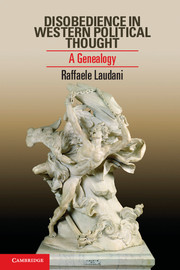Foreword by Adam Sitze
Published online by Cambridge University Press: 05 June 2014
Summary
It is, to say the least, a propitious moment for Raffaele Laudani's study of disobedience to appear in English translation. Over the course of the first, long decade of this new century, “disobedience” would seem to have acquired the status of a paradigmatic political experience. Beginning with the antiglobalization protests in Seattle, Washington, D.C., and Genoa, and ending with the “Arab Spring” and the Occupy Wall Street (OWS) movement, various populations now more than ever before seem to be expressing their opposition to their governments’ decisions and policies neither through the institutions of modern political representation (elections, public debates, petitions, and even polls) nor through public rallies, mass demonstrations, and strikes (practices that, in some countries, are themselves “institutions” in the sociological sense of the word) but rather in an altogether different form: by consciously refusing to carry out the constituted laws and even the law-constituting authority of those who hold formal political power. Dissent and
defiance, revolt and resistance, tumults and uprisings – much more than “servitude volontaire,” “tacit and express consent,” “compliance through coercion,” “assujettissement,” “control,” or even “command obeying” – seem increasingly to be emerging as the normal modes in which many populations today relate to their lawfully constituted governments. We find ourselves today, philosopher Alain Badiou has declared, “in a time of riots.” Disobedience, it would seem, is the order of the day.
- Type
- Chapter
- Information
- Disobedience in Western Political ThoughtA Genealogy, pp. vii - xxviPublisher: Cambridge University PressPrint publication year: 2013



